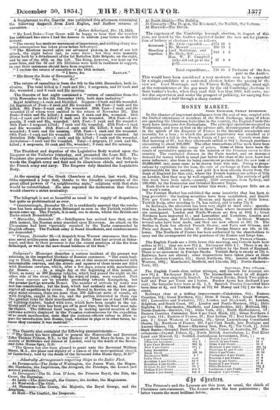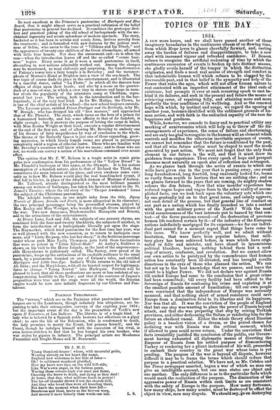iOntrro.
The Princess's and the Lyceum are this year, as usual, the chiefs of Christmas entertaianient. The former shows the best pantomime; the latter vaunts the most brilliant feeriea So very excellent is the Princess's pantomime of Harlequin and Blue Beaid, that it might almost serve as a practical refutation of the belief that pantomime in general has declined. It combines the grotesque drol- lery and practical joking of the old school of harlequinade with the me- chanical ingenuity and scenic splendour of modern spectacle. The story, hacknied as it has been in serious and coral° form, derives novelty from the treatment ; and is furnished with new features by the jealous mad- ness of Selim, who raves to the tune of " Villikins and his Dinah," and the appearance of twenty-one children of the Great Abomelique, all armed with little blue beards. Nor does the amusement end—as is often the ease—when the introduction leaves off and the so-called "comic busi-
ness" begins. Every scene is as it were a small pantomime in itself, abounding in new notions admirably worked out. Among the changes may be mentioned, as most elaborate and surprising, the transformation of Fatima's tower into a fairy temple a la Beverley ; and the metamor- phosis of Mutton's Hotel at Brighton into a view of the sea-beach. The war topic of course finds its place in the entertainment, and is illustrated by a fanciful dance, called "La Flotte," in which all the dancers bear effigies of ships upon their heads; and also by a scene on the quarter- deck of a man-of-war, in which a crew tiny in stature and large in num- ber rivals the popularity of the miniature camp at Chobham, repre- sented last year. The acting, both in the introduction and in the bar- lequinade, is of the very best kind. As for Mr. Huline, the Clown, he is one of the chief artists of his school—the new school toujours entendu. The Lyceum piece, entitled Prince Ptzttypet and the Butterfly, is by Mr. W. Brough ; who has dropped his old "first manner," and approached that of Mr. Planche. The story, which turns on the love of a prince for a humanized butterfly, and has some affinity to that of /a Sy4hIside, is slight enough ; but it answers the purpose of letting the corps de ballet, with Miss Rosins Wright at their head, execute a regular divertissement at the end of the first act, and of allowing Mr. Beverley to embody one of his dreams of fairy magnificence by way of conclusion to the whole. Tbe throne of the Butterfly Queen is just one of those expanding, grow- ing mysteries, in which lovely female forms are placed in picturesque complexity amid a region of etherial lustre. Those who are familiar with Mr. Beverley's creations will know what we mean ; and to those who are not, no words can convey a notion of his marvellous command over scenic effect.
The opinion that Mr. F. W. Robson is a tragic actor in comic guise gains new confirmation from his performance of the "Yellow Dwarf" in Mr. Planche's burlesque of that name, at the Olympic. It is his serious assumption of a fiendish nature, akin to that of Richard the Third, that constitutes the main interest of the piece, and even awakens some curi- osity as to how Mr. Robson would play the real hunchbacked tyrant, if that fell to his lot, in place of the dwarfish &mon of Madame d'Aulnoy. Mr. Talfourd, already distinguished as the most brilliant punster among our writers of burlesque, has taken his facetious talent to the St. James's Theatre; where the old story of the "Sleeper Awakened" forms the subject of the Christmas pantomime. The Adelphi burlesque, as one might infer from the title, Zigzag Travels of _Messrs. Danube and Pruth, is more allegorical in its character; the two principal personages being the personified streams, played by Mrs. Keeley and Miss Woolgar, who wander through divers incidents of the war. Two new danseuses, Mesdemoiselles Maraquita and Benoni, add to the attractions of the entertainment.
At Drury Lane, Jack and Jill, the subjects of one nursery rhyme, are combined with the four-and-twenty blackbirds, the subjects of another, to form the introduction of a harlequinade liberally put upon the stage. The Haymarket, which tried pantomime for the first time last year, was so well pleased with the new sensation, as to return to harlequin once more, and "Little Bo-peep, who lost her sheep," is the fictitious personage under whose garb Miss Lydia Thompson puts forth those fascinations that were so potent in "Little Silver-Hair." At Astley's, Gulliver is shown on his visit to the Horse Islands, as the land of the unpronounce- able Houynhnms is judiciously called. The Surrey, ever proud of its pantomime, keeps up the enthusiasm of its excitable audience to the usual mark, by a pantomime founded on one of Grimm's tales, and entitled Harlequin and Little One-Eye, Sadler's Wells returns to the old tale of All Baba ; and the Marylebone, with all its boasted respect for legitimacy, dares to change "Young Norval" into Harlequin. Patriots will be pleased to learn that all these productions are more or less redolent of un- compromising hostility to the Czar ; and that if the converse of Jaques's proposition were true and the stage were all the 'world, the Russian empire would be torn into infinite fragments by our Clowns and Pan- taloons.



























 Previous page
Previous page